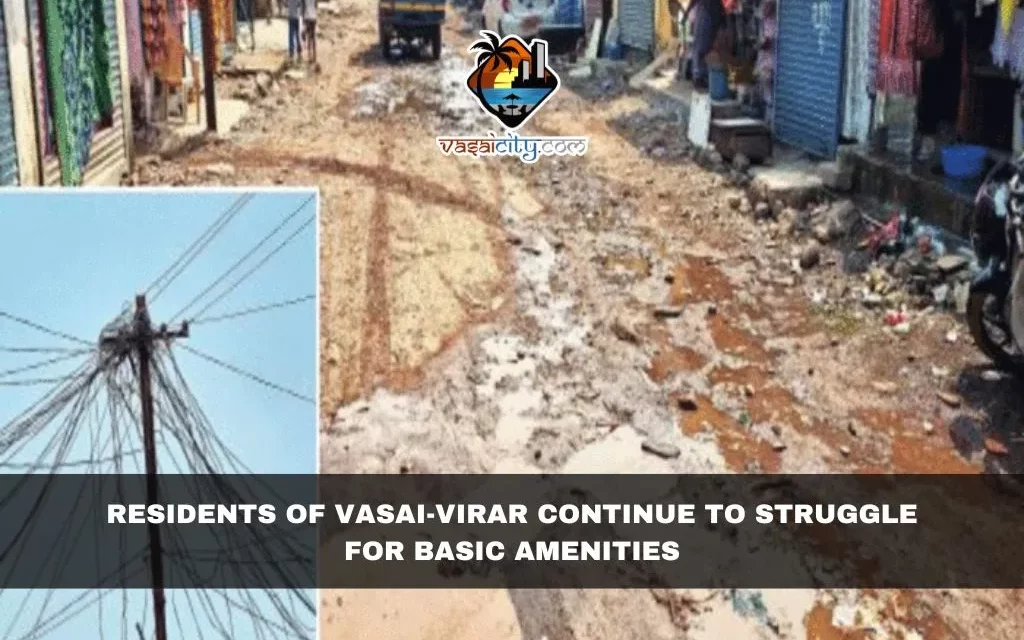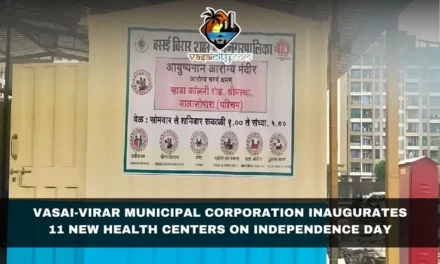The people of Vasai-Virar are still yearning for essential amenities today. Basic necessities like roads, electricity, water, toilets, and schools remain conspicuously absent in this region. The area around the Damar Plant in Vasai (East) is one such place where the residents are eagerly awaiting development. Around 50,000 people call this place home, and they have lodged numerous complaints with authorities, from local representatives to the administration. However, despite their efforts, there has been no progress in terms of development. People here continue to navigate through poorly maintained roads. Witnessing the hardships of life without fundamental amenities in a city neighboring Mumbai, the state of Rajivali, Damar Plant under Vasai-Virar Municipal Corporation (VVCMC) highlights the dire situation.
Accusations have been made that the local ‘Chawl Mafia’ colluded with department officials to establish unauthorized settlements but failed to provide basic facilities. The apathy of municipal officials and the political tug-of-war have taken a toll on the common people. The residents of Damar Plant have been deprived of basic amenities such as electricity, water, roads, toilets, and drainage for nearly 15 years.
No One Listens to Our Problems People lament that no elected representative visits them to address their grievances after winning elections. The area is home to more than 50,000 people, with 80% of them hailing from North India. Local resident Chandu Patil explained that despite living in the VVCMC area, the situation here remains dire. The absence of proper roads exacerbates the difficulties during emergencies. Ambulances and other private vehicles struggle to reach this isolated location.
A 2-Kilometer Walk to Reach the Main Road Residents have to walk approximately 2 kilometers to reach the nearest main road. The VVCMC argues that the entire settlement is illegal, and hence, no budget is allocated for these residents. However, the residents contend that the VVCMC collects taxes of various types, so it is the municipal corporation’s duty to provide the necessary amenities.
The plight of Damar Plant is a stark reminder of the glaring disparity between urban and rural areas, especially when it comes to basic infrastructure. The people here have long been neglected, and their struggles continue despite their efforts to bring their problems to the attention of authorities.
Unfulfilled Promises In the run-up to every election, politicians promise development and better living conditions. They make grand speeches, offer assurances, and seek votes. However, once elected, many of these promises are forgotten, and the people are left to deal with their daily struggles.
The residents of Damar Plant are no strangers to these broken promises. They have seen political leaders come and go, but their lives remain largely unchanged. The lack of basic facilities has become a part of their daily existence. Whether it’s the absence of paved roads, regular access to electricity, or the convenience of toilets, these residents have had to adapt to a life that most of us would find unimaginable.
The Importance of Basic Amenities Basic amenities are the building blocks of a civilized society. They form the foundation upon which communities can thrive and individuals can lead fulfilling lives. When these essentials are missing, it leads to not only physical discomfort but also hampers economic growth, education, and overall well-being.
Vasai-Virar, despite being in close proximity to the bustling metropolis of Mumbai, is a clear example of how the lack of basic amenities can hold a community back. The absence of proper roads means that even medical emergencies become life-threatening situations, as ambulances struggle to reach those in need.
Electricity, which is considered a basic necessity in the 21st century, is a luxury for the residents of Damar Plant. Many people rely on alternative sources of lighting, and the lack of reliable power supply affects their daily lives and economic activities.
Water, another fundamental requirement, is not readily available to all. Residents often have to travel long distances to fetch clean water, which is not only time-consuming but also physically taxing, especially for the elderly and children.
The absence of proper sanitation facilities is not just inconvenient but also a threat to public health. The absence of toilets and drainage systems poses a risk of waterborne diseases and contamination.
The Impact on Education Perhaps one of the most significant casualties of this lack of infrastructure is the education of the children in Damar Plant. Schools are scarce, and even when available, they often lack basic amenities such as clean water and functional toilets. This creates an environment that is far from conducive to learning.
The lack of access to quality education hampers the development of the younger generation. It limits their opportunities and perpetuates the cycle of poverty and deprivation. Education is the key to breaking this cycle, and without it, the chances of a better future for these children are dim.
The Role of Local Government Local government plays a crucial role in providing and maintaining these basic amenities. It is their responsibility to ensure that communities have access to clean water, electricity, roads, and sanitation facilities. When local governments fail to fulfill this role, it is the people who suffer the consequences.
In the case of Damar Plant, the residents allege that their complaints have fallen on deaf ears. They have approached the municipal authorities multiple times, but the promised development has not materialized. The blame game between the local government and political parties has only added to their frustrations.













